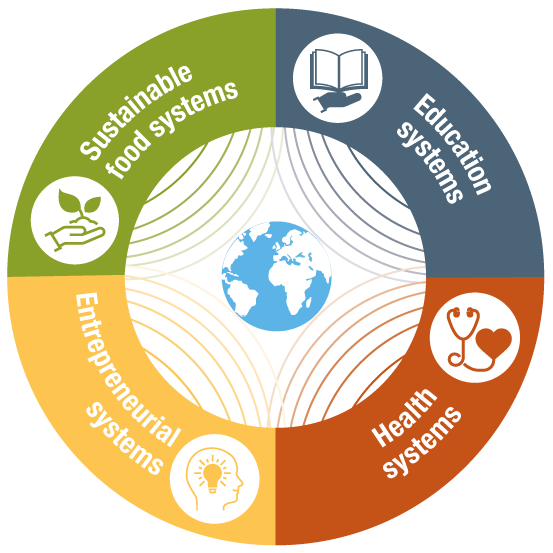Our expertise:
a systemic approach to
sustainable development
Today's global challenges are complex and interconnected. To address them, Louvain Coopération takes coordinated action on four systems:




This strategy enables the development of cross-cutting, coherent and sustainable responses that improve living conditions and strengthen the resilience of individuals and communities.

Cross-cutting themes
Four cross-cutting themes influence and are taken into account in all our activities:
- Gender
- Environment
- Human rights
- Decent work
A scientific approach
Louvain Coopération bases its work on a scientific, transdisciplinary and collaborative approach. It draws on research, cross-disciplinary expertise and continuous learning. It develops its projects with vulnerable communities and its partners, using an ethical, inclusive and sustainable approach.
Two examples of concrete projects combining health,
entrepreneurship, sustainable agriculture and education
Working alongside cassava processors in Benin
In Benin, we support cassava processing cooperatives, an activity carried out mainly by women. The workers improve their productivity and income thanks to our support in developing entrepreneurial skills and training on management tools.
Literacy to support entrepreneurship
In terms of education, they attend functional literacy programmes and can then aim for positions of responsibility within their cooperative or community, to make their voices heard.
Easier access to healthcare
Together, members of the same cooperative join a mutual health insurance scheme thanks to the income they earn from their activities. They can access healthcare at a lower cost for themselves and their families.
Working alongside fishing cooperatives in Madagascar
We support several fishing cooperatives on the west coast of Madagascar. Thanks to training, better organisation and appropriate equipment, fishermen are improving their daily catches.
Preserving vital natural resources
Raising awareness about sustainable mangrove forest management enables them to preserve their environment and fishery resources.
Learning for decent incomes
Fishermen's wives join solidarity savings groups, take functional literacy classes and learn fish processing and preservation techniques to increase selling prices. They develop small economic activities, improve their leadership skills and become more financially independent.
